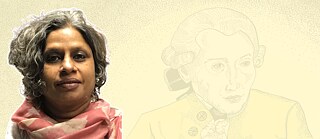Kant's Reception in India
Kant’s moral philosophy

Kant holds that all human persons possess dignity, or intrinsic value, under all circumstances. While the notion of human dignity precedes Kant, I think that he does more than anyone else to emphasize the centrality of this notion, and to draw out its political implications. The idea of the “inherent dignity” of human beings finds a place in the Universal Declaration of Human Rights of the United Nations from 1948, and continues to influence both contemporary thought and public debate.
The fact that this idea has persisted in a world in which people are routinely killed, maimed, or dispossessed is remarkable, and likely attests at least to some extent to its truth. But surely this is not enough in our project of creating a just world order. Kant says not only that we all possess intrinsic dignity, but also that we must strive to act with dignity. To this end, we need somehow to learn to perceive both ourselves and others as possessing dignity, and to take that into account in deciding how to act in situations inflected with desires, interests, confusions and fears, our own and those of other people. For this purpose, an engagement with Kant’s moral philosophy remains indispensable in our time.
Kant’s idea of free thought

Kant’s idea of free thought remains relevant in 2024, as it awaits further exploration and realization. He dwells on the importance to think freely by considering the diversity of beings, cultures, ecologies, geographies, and religions in the world. Thinking freely is an active practice of arriving at a point of view through interaction between self and the outside world. In this process, we develop a point of view by forming our own opinions.
Kant believes that to think freely requires an open engagement with one’s own experiences of the others, especially those who disagree and differ. Thinking is like working together - a work in progress, both critical and self-corrective. It is based on the reciprocal and permeable relationships between vulnerable fraught beings, cultures and the like inhabiting the planet. Such coexistence, characteristic of life itself in Kant’s view, enables us to move past our own limits and limits of our jobs, like being a clerk or a teacher. As Kant suggests, by understanding others, we foster public debates and discussions to present and engage with points of view, questioning and reconstructing them, while connecting with the broader community.
Kant’s insight significantly resonates with K.C. Bhattacharyya’s 1928 ideal of “svaraj” or freedom in the world of thought and ideas. A philosopher of the Indian Renaissance influenced by Kant, Bhattacharyya was also firmly rooted in Indian traditions, such as Vedanta. Thinking freely was for him a process of both assimilating and contesting Western thought in the course of dialoguing with Indian philosophy by reading, interpreting and reconstructing both traditions. Such a spirit of what Kant characterised in 1784 as the daring to think, or “sapere aude” in Latin invoking the Roman poet Horace, has made Kant’s own intercultural reception in India possible, just as it has in other parts of the world. Global Kant reception has traversed over the centuries and negotiated a multiplicity of philosophical positions, such as German idealism, phenomenology, postcolonialism and feminism.